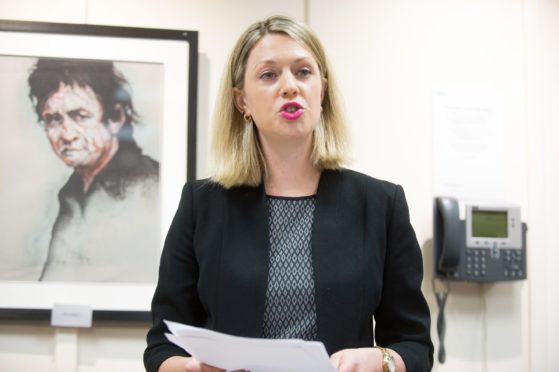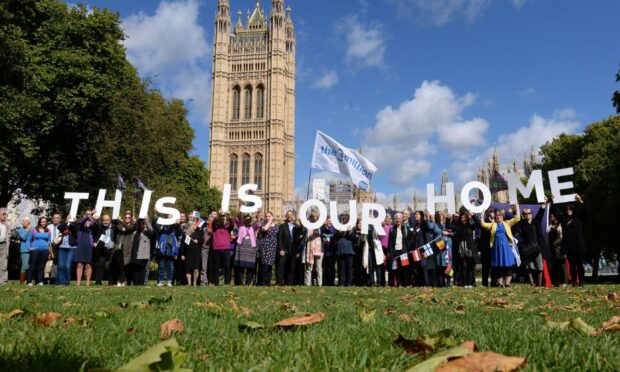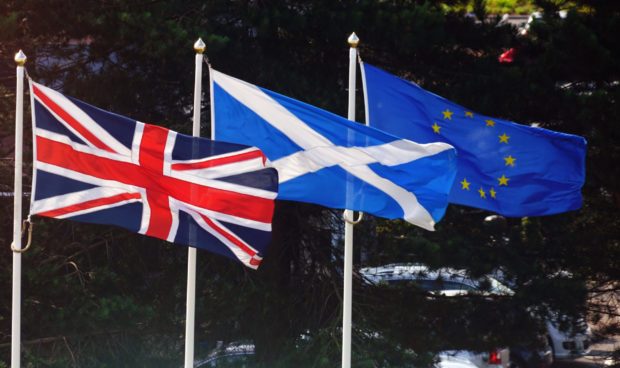EU nationals are being told “you’re welcome here and we want you to stay”, on deadline day to apply to stay in the country legally.
Wednesday 30 June is officially the last day for EU citizens living in Scotland to apply for settled status.
From Thursday, those who have not applied to the EU Settlement Scheme will become “undocumented”, and will lose their previously guaranteed rights to access the NHS, public sector housing, care services and unemployment benefit, as well as their rights to work and rent in the UK.
‘They all deserve so much better’
Scotland’s Europe Minister Jenny Gilruth now says the Scottish Government will do “everything within its power” to help EU citizens who want to stay in Scotland to do so.
She said: “I am deeply concerned that after today thousands of EU citizens in Scotland could be left in limbo, not knowing whether they can stay here because of the UK Government’s actions.
“These are people who have chosen to make Scotland their home and who continue to contribute so much to our society.
“In return they are being forced to live with unacceptable levels of stress about how Brexit will affect their lives, careers and families.
“They are our family members, friends, neighbours and colleagues and they all deserve so much better.
They are our family members, friends, neighbours and colleagues and they all deserve so much better.
“People in Scotland overwhelmingly rejected Brexit and I do not believe that any sort of settlement scheme is necessary.”
Previously Ms Gilruth said the Scottish Government wouldn’t want to be associated with UK Home Secretary Priti Patel or the UK Government’s “hostile environment” towards immigrants.
‘This is your home, you’re welcome here, and we want you to stay.’
A recent report from independent research group UK In A Changing Europe suggests there could still be thousands of people who haven’t yet applied to the EU Settlement Scheme, particularly those over the age of 65 and under the age of 18.
The UK Home Office says 5.6 million EU citizens have already applied for settled status to stay in the UK, including 276,000 in Scotland, but it is thought there is a backlog of almost 400,000 applications still to be processed.
The Scottish Government had urged the UK Government to extend the deadline, but Immigration Minister Kevin Foster says this will not happen.
📣 @JennyGilruth: "The UK Government is still consistently ignoring the Scottish Government’s legitimate concerns."
💛 If you're an EU citizen in Scotland, this is your home – please stay.
🗓️ Make sure you apply for Settled Status by this Wednesday.https://t.co/0tVPprVRGR
— The SNP (@theSNP) June 28, 2021
Ms Gilruth added: “I am equally disturbed by the UK Government’s refusal to extend the deadline despite repeated requests from the Scottish Government and third sector organisations, particularly in the face of the huge backlog of cases that are yet to be processed.
“My message to EU citizens remains the same: this is your home, you’re welcome here and we want you to stay.
My message to EU citizens remains the same: this is your home, you’re welcome here and we want you to stay.
“The Scottish Government will do everything within its powers to help you stay in Scotland and this includes supporting our partners to help people make late applications to the scheme.”
Employee checks and asking for documentation from July 1
From Thursday 1 July UK Government Immigration Enforcement agents will be sent to complete “employee checks” on businesses, and will be able to ask EU nationals for documentation to prove they have the right to work in the UK.
If they do not have the correct paperwork, they will be given 28 days to complete an application.
Ms Gilruth says the Scottish Government has put in place protections to guarantee no EU citizen living in Scotland will lose their right to access healthcare, and adds she is working with local authorities to make sure no one falls through the cracks when it comes to housing.
5 years on from the #Brexit referendum First Minister @NicolaSturgeon has written in @POLITICOEurope stressing @scotgov's desire to see EU citizens to #StayinScotland.
Read more ➡️ https://t.co/HyBysh4Jto pic.twitter.com/MQNH2uMYMS
— Scottish Government Brussels (@ScotGovBrussels) June 23, 2021
However the Europe minister adds there is only so much the Scottish Government can do, as it is difficult to offer protection on issues that are reserved to Westminster, such as benefits.
How do you apply to the EU Settlement Scheme?
The EU Settlement Scheme is open to anyone who comes from the EU, Switzerland, Iceland, Norway or Liechtenstein and wants to continue living in the UK.
Family members of an eligible person from Northern Ireland can also apply.
To apply, people will need to show their identity, either using a valid passport, residence permit or residence card, and proof of their residence in the UK.
Applications can be done online on the UK Government’s website.
⏳ Only 2 days left until the EU #SettlementScheme deadline of 30 June.
Apply TODAY if you are an EU, EEA or Swiss citizen or their family member (and resident in the 🇬🇧 by 31 December).
➡️ https://t.co/2ta1NkpJ5a pic.twitter.com/4f7AxyeAgq
— Home Office (@ukhomeoffice) June 29, 2021
Those who need help with their application can call 0300 123 7379 if they are in the UK, or +44 (0)203 080 0010 if they are outside the UK.
If people do not have internet access, are finding it difficult to gather the evidence they need, or have problems understanding England, they can get help by contacting the Citizen’s Advice Bureau online or by calling 0800 916 9847.
Those who have lived in the UK for a continuous five-year period will usually be granted settled status, however those who have not lived in the UK for this length of time will get pre-settled status.
Citizens who are given pre-settled status can stay in the UK for a further five years from the date this is granted, and can apply for settled status once they have clocked up five full years of continuous residence.
Applicants will be checked against the UK’s crime databases, however they will still be eligible for settled status if they have been convicted of a minor crime – for other convictions it will be decided on a case-by-case basis.




